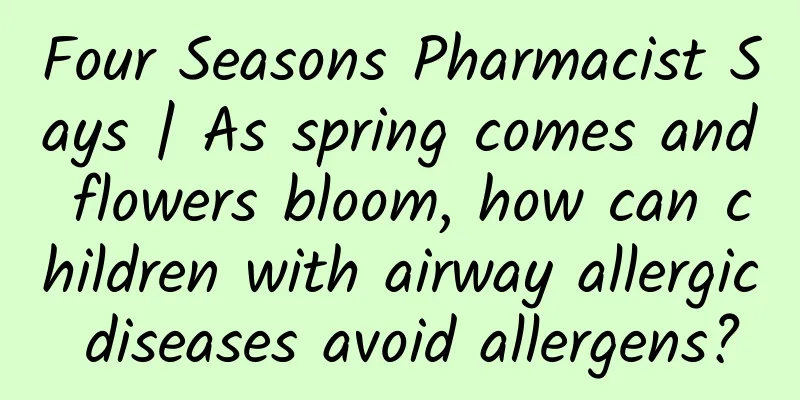Four Seasons Pharmacist Says | As spring comes and flowers bloom, how can children with airway allergic diseases avoid allergens?

|
When spring comes and flowers bloom, it is a good time to go outside and enjoy the beautiful scenery. However, it is a very painful time for children with airway allergies. They often sneeze, have runny nose, nasal congestion, cough, and even have acute airway reactions, which makes parents anxious! This is because pollen, poplar fluff, dust mites, etc. in the air are allergens. Airway allergic diseases not only affect the quality of life of children, but sometimes even endanger their lives. For children with airway allergic diseases, avoiding contact with allergens is a very effective prevention and treatment method. Today, Yaowa will give you some tips - how to help children with airway allergic diseases avoid common allergens. The first step to avoid dust mites Dust mites are tiny arthropods that are commonly found in people's homes and are widely distributed. They like to live in warm (15℃~35℃), humid (humidity 50%~80%), dark environments. Common ones include house dust mites and dust mites. Children who are allergic to dust mites will experience symptoms such as nasal congestion, nasal itching, continuous sneezing, tearing, and dry cough when they come into contact with dust mite environments such as quilts, beds, and pillows. To avoid dust mites, Yaowa has a trick 1. Keep the room clean and well ventilated, and reduce the indoor humidity (<50%-55%); 2. Use well-sealed bed boards and pillows. You can add a dust mite cover on the child's mattress. 3. Wash bed sheets and pillows in hot water (>55℃) every week; 4. Try not to place stuffed toys, carpets, tapestries, etc. in your home. Tip 2: Avoid pollen Pollen is spread mainly in two forms: insect-borne and wind-borne. In addition to those colorful flowers, children are also allergic to pollen because of trees and weeds that do not seem to bloom, such as the sycamore, birch, and poplar trees that are widely planted in most cities in my country. These plants have a high pollen content and are very light, which is dispersed in the air by the wind. Children who are allergic to pollen will also experience symptoms such as nasal congestion, itchy nose, continuous sneezing, tearing, and dry cough when exposed to pollen. To avoid pollen, Yaowa has a trick 1. When there are high-density plants near your home, try to keep the windows closed; 2. Reduce or avoid drying the sick child’s bedding outdoors; 3. Reduce the outdoor activities of children. If going to areas with high pollen density, children should wear masks; 4. If conditions permit, air filters can be installed. Tip 3: Avoid cockroaches Cockroaches, commonly known as "Xiao Qiang", are at their peak of reproduction in spring, with nests of cockroaches ready to move. Children who are allergic to cockroaches are not only allergic to the cockroaches themselves, but also to their secretions, excrement, and corpses. To avoid cockroaches, Yaowa has a trick 1. Use safe insecticide to kill cockroaches; 2. Repair the gaps in the walls of your home to ensure that your home is dry and clean; 3. Cultivate good eating habits in children and do not bring food into the bedroom; 4. Clean up food residues and garbage promptly to avoid creating "food conditions" for cockroaches. Tip 4: Avoid mold The mold we often talk about is the common name for various fungi. These molds are very small and can only be seen under a microscope. Children who are allergic to mold often have symptoms such as coughing, sputum, and wheezing. Especially during the rainy season, parents must pay attention. To avoid mold, Yaowa has a trick 1. Keep your home dry and ventilated, and keep humidity below 50%; 2. Bathrooms, basements, etc. need to be dehumidified regularly to avoid accumulation of residual water; 3. Sewers, kitchens, trash cans, air conditioning filters, etc. need to be cleaned and disinfected regularly to prevent mildew; 4. If the child's clothes and bedding are moldy, they need to be cleaned and disinfected in time; 5. Carpets, books, newspapers and clothing should be protected from moisture and mildew, and food should also be stored properly to prevent mildew. Developing good living habits is also very important for children with airway allergic diseases. The key is to eat a nutritionally balanced diet, actively participate in physical exercise, and develop good work and rest habits. |
Recommend
What to do if you have a headache during menstruation
Women often experience headaches during menstruat...
[Medical Q&A] Is childhood asthma a genetic disease? How to prevent it?
Planner: Chinese Medical Association Reviewer: Ni...
Why is there bloody leucorrhea
One problem that often worries female friends is ...
How many times should the cervical mucus plug be discharged?
Cervical mucus plug is relatively important for w...
What medicine should breastfeeding women take for colds
During breastfeeding, women must pay close attent...
Long-term coughing and coughing up blood are actually related to bathing! Be careful when bathing in winter!
Review expert: Peng Guoqiu, deputy chief physicia...
Review of 16 children's face creams: Dryness, redness, and peeling, your child's face is finally saved!
In autumn and winter, the weather becomes dry and...
How many months of pregnancy does it appear on the face
The phenomenon of developing spots after pregnanc...
I itch, I scratch, therefore I exist - the scientific secrets of itching
The so-called itch is a kind of discomfort that m...
Why don't lobsters go into their holes? How to breed crayfish in winter without freezing to death
We know that after mating, the female crayfish wi...
Dietary nutrition for pregnant women
Pregnant women, for their own health and the deve...
Suddenly I have my period every 20 days
Irregular menstruation is just a condition, and t...
What medicine should I take to stop bleeding during menstruation?
Every woman has her own menstrual regularity. Whe...
Reasons for not vomiting in early pregnancy
Many women have many symptoms of discomfort when ...
Are there any side effects for women drinking breast enhancement tea?
The breasts are a very important part of a woman&...









